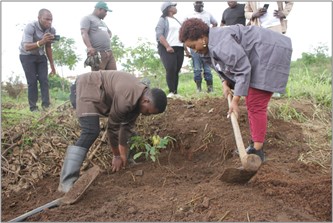The Deputy Mayor of the Lilongwe City Council, Councilor Esther Sagawa, Launches the Forest Restoration of the Lingadzi Riverine in Lilongwe
Report by Harold Kangoli and Steve Makungwa

On 19 February 2022 the Deputy Mayor of the Lilongwe City Council, Councilor Esther Sagawa, launched the forest restoration of the Lingadzi Riverine. The project is an initiative of the Lilongwe City Council and it aims to plant and sustainably manage 7,300 native riverine tree species on a 24 hectare degraded riverine along the Lingadzi River in Lilongwe. The design, implementation and monitoring of the project is facilitated by the Lilongwe Chapter of the Global Landscapes Forum (GLF), an initiative of Malawi’s Centre for Applied Systems Analysis (CASA) in collaboration with the International Union of Forest Research Organizations (IUFRO.
Speaking at the launch, the Deputy Mayor of the Lilongwe City Council, Councilor Esther Sagawa, expressed satisfaction to note the interest and passion of the local community living along the riverine and other key local stakeholders coming to action together to bring back life to the degraded riverine of the Lingadzi River: “I am extremely thrilled to see you, the local community of Area 47, members of the Association of Environmental Journalists in Malawi (AEJM), and the youth through the National Youth Network on Climate Change (NYNCC) coming together in action, and united by your passion to successfully restore the degraded riverine of the Lingadzi river” “Many thanks to the Lilongwe Chapter of the Global Landscapes Forum (GLF) for connecting us all under this initiative”. “As a City Council we shall do everything possible to create a favorable environment that will render success to the implementation of this initiative” Said Councilor Sagawa, Deputy Mayor of the City Council.
Speaking at the launch, the Leader of community living along the riverine, Rev. Dr. Emmanuel Chinkwita-Phiri, outlined the significance of the project to his local community: “Our homes have been broken-into, our youth have been exposed to and many of them have become victims of drug and alcohol abuse as the riverine has been an epicenter of these illegal activities”. “In 2017 the flood water of the Lingadzi River invaded our homes, destroying property and making some houses uninhabitable”. “Today marks the beginning of the new chapter for our community and we fully welcome and support the initiative” said Rev. Chinkwita-Phiri.
Speaking with the local media after the launch, Dr. Steve Makungwa, a GLF Lilongwe Chapter Coordinator and Director of CASA, stressed the need to adhere to the best practices in tree planting to ensure successful establishment and survival of the newly planted trees: “The country plants millions of tree seedlings every year but we don’t see many of these across the country”. “Many of these newly planted tree seedlings do not survive because of our failure to follow the best practices for land or spot preparation for tree planting, at planting, and post-tree planting activities”. “For example, we recommend the planting holes be of 1 cubic meter and backfilling of the top soil should be mixed with compost or chicken manure to provide initial nutrition for the newly planted trees.” “This is what we shall be doing in planting the 7,300 trees in this riverine”, said Makungwa.
The Lingadzi River is one of the two important rivers passing through the Central area of the Lilongwe City and it is severely degraded. The forest restoration of the Lingadzi Riverine is implemented in response to the Strategic Objective 3.2 of the 2020-2025 Strategic Plan of the Lilongwe City Council. The initiative is part of the Greening Lilongwe Campaign which aims to restore the City’s degraded open spaces and riverine areas, to plant avenue trees along the City’s major roads, and to establish green schools, offices, homesteads and cemeteries. It is also a key component of the Lilongwe Ecological Corridor Initiative (LECI), which aims to connect the fragmented natural assets and green spaces of the City.
The GLF Lilongwe Chapter is an initiative of Malawi’s Centre for Applied Systems Analysis (CASA) and IUFRO. The Chapter is part of the GLF community.
Find out more at: https://www.iufro.org/science/special/spdc/netw/glfxmalawi/

Leave a Reply